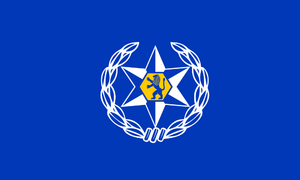District system (Yisrael): Difference between revisions
| Line 7: | Line 7: | ||
==History== | ==History== | ||
==Federal-local relationship== | ==District government== | ||
===Federal-local relationship=== | |||
The [[1920 Constitution|Royal Constitution]] grants each district a large amount of political independence more common found in {{wp|federal state}}s rather than the {{wp|unity state|unitary system}}s often utilized for states as small as the Kingdom. Each of the eight districts elect their own district governments, including a governor and legislative council. | The [[1920 Constitution|Royal Constitution]] grants each district a large amount of political independence more common found in {{wp|federal state}}s rather than the {{wp|unity state|unitary system}}s often utilized for states as small as the Kingdom. Each of the eight districts elect their own district governments, including a governor and legislative council. | ||
| Line 13: | Line 14: | ||
The districts have independent power to levy many of the same types of taxes as the Royal Government, and are chiefly responsible for funding the local police and security forces, education subsidies, environmental works, overseeing local business regulations, and allocating aid funds to {{wp|municipality|municipalities}} under their purview. The districts have enabling power to charter, oversee, and veto policy and powers granted to cities and localities. | The districts have independent power to levy many of the same types of taxes as the Royal Government, and are chiefly responsible for funding the local police and security forces, education subsidies, environmental works, overseeing local business regulations, and allocating aid funds to {{wp|municipality|municipalities}} under their purview. The districts have enabling power to charter, oversee, and veto policy and powers granted to cities and localities. | ||
The [[Knesset|Royal Knesset]] has appropriated approximately $1.7 billion [[Yisraeli new shekel|shekels]] in district and local aid in recent years. | The [[Knesset|Royal Knesset]] has appropriated approximately $1.7 billion [[Yisraeli new shekel|shekels]] in district and local aid in recent years. | ||
===District governors=== | |||
===District legislatures=== | |||
==Control over localities== | ==Control over localities== | ||
Latest revision as of 21:15, 26 November 2020
This article is incomplete because it is pending further input from participants, or it is a work-in-progress by one author. Please comment on this article's talk page to share your input, comments and questions. Note: To contribute to this article, you may need to seek help from the author(s) of this page. |

The District system of Yisrael refers to the system of federalist sub-national administrative districts in the Kingdom of Yisrael, known in Hebrew as mehozos (מחוזות; singular: mahoz). Unlike most nation-states, whose subnational administrative divisions have customarily been either "provinces" or "states," because of the Kingdom's small size and historical development, a framework of eight districts were created to administer Yisrael. Unlike most other states that have district-level political divisions, the Yisraeli districts have a quasi-autonomous and federal-local relationship with the central royal government in Yerushalayim.
History
District government
Federal-local relationship
The Royal Constitution grants each district a large amount of political independence more common found in federal states rather than the unitary systems often utilized for states as small as the Kingdom. Each of the eight districts elect their own district governments, including a governor and legislative council.
The districts have independent power to levy many of the same types of taxes as the Royal Government, and are chiefly responsible for funding the local police and security forces, education subsidies, environmental works, overseeing local business regulations, and allocating aid funds to municipalities under their purview. The districts have enabling power to charter, oversee, and veto policy and powers granted to cities and localities.
The Royal Knesset has appropriated approximately $1.7 billion shekels in district and local aid in recent years.
District governors
District legislatures
Control over localities
The 1920 Constitution gives the districts the power to establish enabling legislation for all sub-district political entities, including cities, towns, and special subdistricts. All localities' political charters were approved by the district governments, and the localities only have the powers granted to them by the legislative councils. These powers are discretionary and may be revoked by the district governments as they see fit.
Foreign policy disputes
Southern and Eastern Districts
Districts
| District | District Capital | Population | Largest City |
|---|---|---|---|
| Northern District | Shomrom | 454,098 | Natzras |
| Dervaylik District | Dervaylik | 1,302,885 | Dervaylik |
| Central District | Netanya | 6,874,231 | Rishon LeZion |
| Western District | Tel Eilat | 5,412,976 | Ashkelon |
| Southern District | Beersheva | 881,935 | Beersheva |
| Yerushalayim District | Yerushalayim | 1,431,566 | Yerushalayim |
| Eastern District | Modiin | 3,483,677 | Modiin |
| Yarden Valley Special District | Yericho | 632,713 | Chevron |
